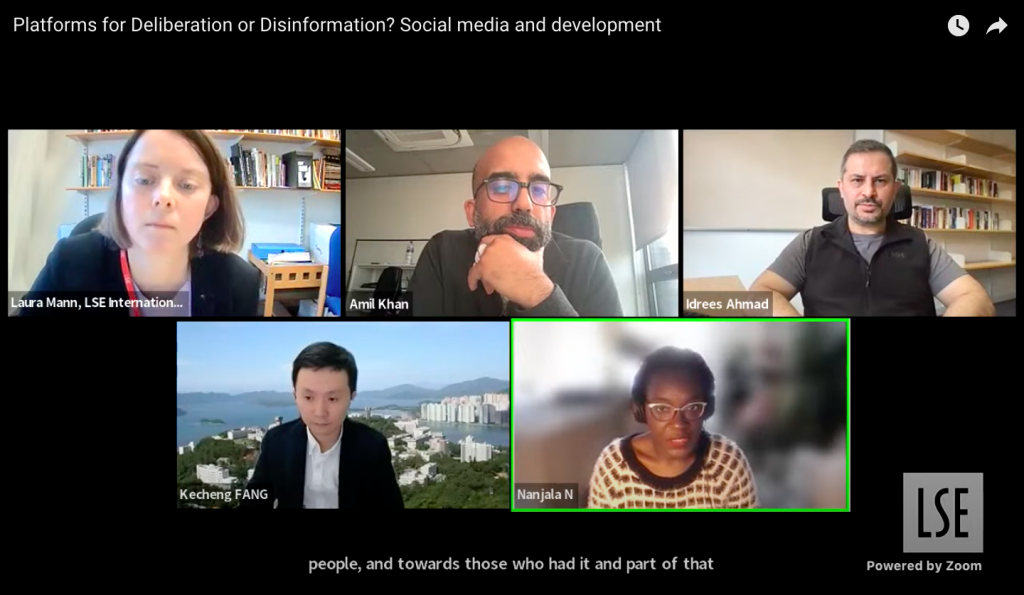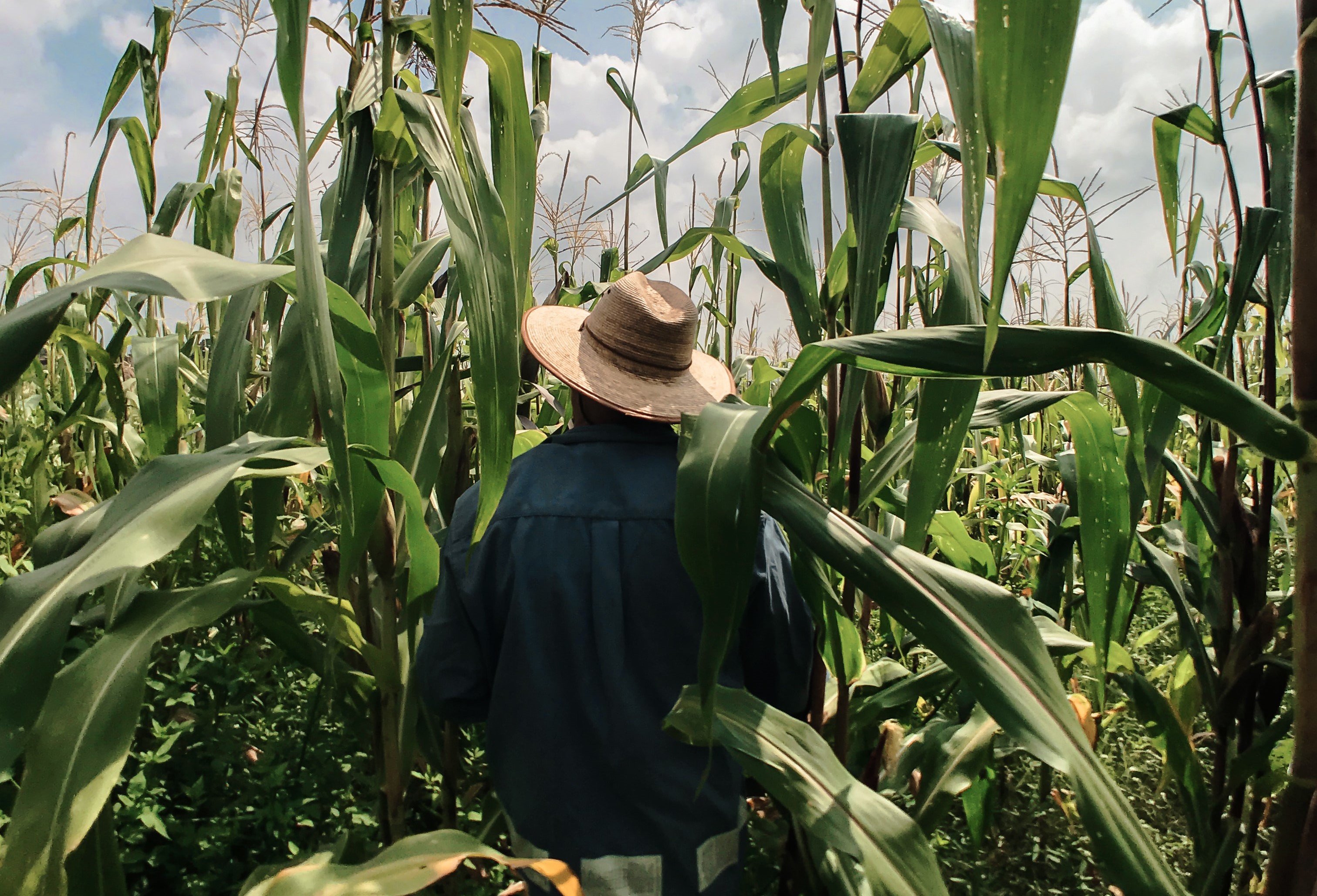On Friday 2 December, LSE Department of International Development held its final Cutting-Edge Issues event of the year on the topic, “Platforms for Deliberation or Disinformation? Social media and development.” The panel event was chair by Dr Laura Mann and featured four panellists: writer and researcher Nanjala Nyabola, Idrees Ahmad from the University of Essex, Kecheng Fang from the Chinese University of Hong Kong and Amil Khan, Director and Founder of Valent Projects.
Read what Arkadeepra Purkayastha, Antonia Lapp and Kayla Kim took away from the lecture below. You can watch the lecture back on YouTube or listen to it as a podcast.

Facebook. Twitter. TikTok. Instagram. Over the past decade, social media platforms have come to form a significant part of the development landscape. Not only have they emerged as spaces to form personal or professional connections, but they have also served as sites that allow one to confront, contest, and create. In this context, last week’s panel discussion delved into the rising politicisation of the internet, raising questions about the actors that constitute and dictate the hierarchy within social media platforms.
At the beginning of the discussion, Dr Laura Mann highlighted an important point regarding the geographical limitations of the internet. Who really has access to digital technology and to what degree is this regulated? Nanjala Nyabola, a writer and political activist based in Nairobi, brought forward that social media platforms give ordinary citizens the power to shape agendas and the space to share their stories and perspectives. This, however, continues to be a privilege. In several countries, social media platforms are heavily regulated by authoritarian governments and capitalists that silence the critical masses who oppose them and journalists who challenge their credibility.
This discussion immediately sparked a thought since it was so close to home. It reminded me of the 2019 political climate of India-administered Kashmir when the BJP (the right-wing ruling party of India) suspended internet services in the valley for almost 150 days. This was done as a deliberate attempt to silence the citizens of Kashmir who opposed the government’s decision to abrogate Article 370 of the Indian Constitution, which granted special status to Kashmir. The government’s curb on internet connection inevitably created an information vacuum, enabling the prevalence of a state-controlled narrative. While Twitter emerged as a space to voice dissenting opinions, tweets of journalists who were critical of the government’s judgement were routinely removed from Twitter and were the root cause of widespread political violence.
On a more positive note, Amil Khan, the Director and Founder of Valent Projects, suggested the the transformative possibility of social media; strategies such as effective advertisements and media campaigns that could have emancipatory potential. Fellow panellist Kecheng Fang, an Assistant Professor at The Chinese University of Hong Kong, resonated with this view. He mentioned that social media had successfully enabled two forms of connections — human-to-human connection and human-to-information connection. This had been particularly significant during the COVID-19 pandemic. Douyin, known as TikTok outside of China, and a similar short form video platform, Kuaishou played a crucial role in alleviating the conditions of farmers in China whose livelihoods had been severely impacted. Through live streaming of videos, farmers were able to market agricultural products which the public could directly purchase.
At a time when Twitter is potentially shutting down and Facebook is being accused of increased censorship of foreign policy, the panel discussion left me thinking – can TikTok emerge as a democratic space for political expression and youth mobilisation? Or is its reach limited to a certain section of society?
– Arkadeepra Purkayastha
______________________________________
Digital technologies came with the promise to democratize public debate by providing digital spaces in which everyone could raise their voice, exchange, and learn — a revolutionary vision that presaged a world of participation, equality, and a horizontal discursive power balance. Today, this vision seems like a bygone dream. Friday’s panelists discussed the “democratizing promise” of digital technology and argued that a re-engineering is not guaranteed, but possible.
Nanjala Nyabola contextualized the emergence of the promise in an environment of discourse being produced in an ivory tower. Digital technology radically changed this by equalizing voices. However, this opportunity caused damage when networks were misused for political interests, eg in 2019 during the Ethiopian war. To achieve a truly equal space for voices, Nyabola asked us to reconsider ownership and the possibility to shift platforms into the hands of its users.
Kecheng Fang highlighted social media’s ambiguous role in China for development, eg, public monitoring could be used for good as a tool for the state to listen to its citizens; on the other hand, the Chinese state can control the digital space to silence opposing voices. Fang clarified the goal for digital technologies to optimize human-human and human-nonhuman connection. However, this aspiration yields a public-private conflict of interest.
Idrees Ahmad addressed positive consequences of digital technologies such as increasing the accountability of governments. However, states simultaneously introduced “synthetical activities”, which aimed at neutralizing public demand and increasing monitoring and surveillance. Musk’s twitter purchase recently presented new challenges to the public space. While Ahmad sees a potential for change, he also concluded that the unfolding of this potential is not guaranteed.
Amil Khan addressed two key challenges development agencies face today: First, the “grey economy” of social media, consisting of unofficial advertisement services, which probably significantly influence public opinion and require further research. Second, development agencies‘ assumption that posting “truth” makes posts go viral. However, truth is not a guarantee for success. Nyabola added that a further factor in this is the lack of authenticity in the social media presence of development agencies.
In conclusion, we cannot know whether or not the early promise of digital technologies will be fulfilled; it is contingent on the work that is put into it and the way it is used and controlled. However, the panelists showed that there is a possibility to create a safe, equal, and public space for all voices, though it might require a radical re-imaging of our current reality.
– Antonia Lapp
______________________________________
“Whoever controls the agenda, whoever controls the story, whoever is able to order the story is the person who is able to order the action that happens within a society.”
Nanjala Nyabola, writer and researcher, reminds us that the power of the public sphere belongs to those who create its narratives. This action-ordering power gives social media potential for both positive connection and great harm. In the final Cutting-Edge Issues in Development lecture of the term, the four panellists, led by chair Dr Laura Mann, shared their views on the relationship between development and social media.
The panellists first argued why digital platforms were initially viewed to have great promise for development. In theory, the platforms should democratise the agenda and allow people to push for more radical definitions of development. Dr Kecheng Fang, Assistant Professor at The Chinese University of Hong Kong, provided a good example of transformative development: on the short video platform “Kuai,” a major competitor of TikTok in China, farmers have begun to use live e-commerce streaming to sell agricultural products which might otherwise be unsellable.
Fang also noted that this change is only promoted as it aligns with the major poverty alleviation policies of the current administration. It is not as radical as it initially seems. Idrees Ahmad, Director of Journalism at the University of Essex, characterised the shift in social media from levelling power to enforcing it as a gradual process that occurred as people in power learned how to commandeer the tools, but it can also be simultaneous, as in the case of the Chinese farmers.
Outside the ordinary person/powerful leader binary, a third group controls our narrative: platforms’ owners. Amil Khan, Director and Founder of Valent Projects, noted that private companies are optimised to maximise profits for shareholders. Khan argued that Twitter decided to remove Trump only after the January 6th attacks on the US capitol, despite his many previous violations of Twitter’s terms and conditions, because his actions threatened the survival and financial stability of the platform. The false and dangerous information we see online is also a byproduct of platform owners’ need to maximise profit.
If digital platforms are accountable not to their users but to shareholders, and if powerful entities use platforms to surveil and misinform, how can development practitioners remain optimistic?
Fang suggested that while we need social media that prioritises inclusion and safety, this kind of model is not best for business. The challenge is therefore to make a business model which is inclusive, safe, and profitable. Ahmad, sceptical that a different model is possible, suggested that development organisations learn to better adapt messaging to the current models. Nyabola argued that the problem is one of ownership and asks instead: is a user-owned, public interest-first version of social networking possible?
This lecture raised more questions than answers—fitting, as it is always best to approach social media with caution. I challenge the reader to weigh the panellists’ possibilities and develop their own vision of what “better” platforms might constitute.
– Kayla Kim
You can watch back the recorded lectures from the Cutting-Edge Issues in Development series 2022.
The views expressed in this post are those of the authors and do not reflect those of the International Development LSE blog or the London School of Economics and Political Science.
Main Image: Solen Feyissa via Wikimedia Commons.





